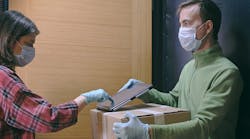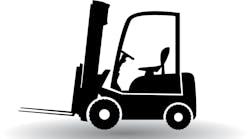America’s courier and parcel delivery firms are urging state and local governments to recognize their role in providing essential transportation services during the Coronavirus crisis.
Couriers must be declared essential service providers in every state for the sake of public safety, says the Customized Logistics and Delivery Association (CLDA), which is urging its member firms to contact their state governors to persuade them to make this designation for jurisdictions where that has not already taken place.
“Members of this industry must contact their governors immediately to get this declaration before they issue Emergency Orders to shelter in place,” says Steve Howard, president of CLDA. “If they wait, it might be too late and the services we provide to keep the supply chain moving could take days or even weeks to start up again. Once governors issue Emergency Orders to shelter in place, they will be shut down and the supply chain will grind to a halt.”
Howard pointed out that because of pleas made by couriers operating in Florida and Washington state, those states’ governors declared the work of package delivery and courier firms as essential services. CLDA also reported that its members in the states of Minnesota, New York and California have been in communication with their state governors and expect for the desired designation to be announced within a matter of days.
“We are asking governors in all 50 states to use their offices to declare the courier industry as an ‘Essential Service’ under your peacetime emergency authority,” Howard says. “Courier services throughout this country are absolutely critical to both our current pandemic crisis and our supply chain.”
According to the CLDA president, couriers are actively engaged in delivering supplies needed to cope with the current crisis through the transportation of:
• COVID-19 test samples from clinics and testing facilities to laboratories for diagnosis.
• Tissue and blood samples to diagnose and treat COVID-19 related illnesses.
• Pharmaceuticals to residences, assisted living facilities, hospitals and pharmacies.
• Diagnostic testing for all other non-pandemic related illnesses.
• Blood and blood products from blood banks to hospitals and clinics.
Courier companies also are the essential last-mile delivery providers required to support the office supply and equipment requirement of those people who have been ordered to work from home during the lockdown, Howard explains. “Our members are helping these workers by delivering to homes laptops, printers, office supplies and needed documents that can’t be e-mailed.”
He stressed that the courier industry serves a unique need that national delivery services like UPS and FedEx can’t provide—deliveries that are made not just overnight, but in a matter of hours. “Our customers need our services 24/7/365 for deliveries on an immediate, as-needed basis,” Howard says. “Due to the urgent nature of these deliveries they cannot be made by national carriers such as the U.S. Postal Service, UPS and FedEx who deliver in days, not hours.”
Local courier and delivery providers play a much larger role in the economy of the United States than many people realize. Estimates of their numbers have ranged from 700 to as many as 2,000 or more companies nationwide. CLDA currently has more than 400 members.
They are primarily small, family-owned businesses based in metropolitan area who are responsible for transporting locally time-sensitive and high-value items ranging from legal and other important documents to medicines, medical test specimens and organs destined for transplants. Some of these companies also serve as last-mile delivery contractors for national and international package firms like UPS, DHL and Purolator.
Like much else associated with federal and state government response to the epidemic, the designation of certain kinds of business operation as essential to fighting the disease has proceeded in fits and starts, with gaps being filled after initial announcements of which kinds of businesses are considered essential.
Major industry segments—most prominently trucking—have asked the federal government to openly assert that freight haulers and other supply services should be considered essential. The federal government already has adopted less strict enforcement of certain rules during the crisis, including those dealing with hours-of-service rules and drug testing regulations.
“Please contact your governors now,” Howard urges CLDA members. “The longer you wait, the more difficult it will be and the more likely that the supply chain is brought to a halt, leaving medical providers and consumers in desperate need of critical supplies.”




